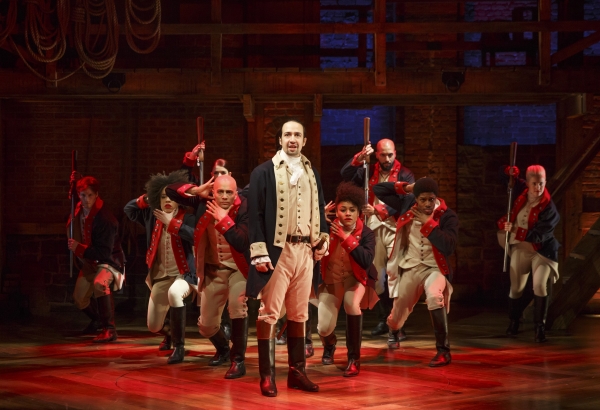Hamilton

(© Joan Marcus)
Electricity pervades the air from the earliest moments, in which a chorus introduces us to the ''bastard, orphan, son of a whore and a Scotsman," who would grow up to become Alexander Hamilton (Miranda), the "ten-dollar founding father without a father." This prologue takes us from Hamilton's impoverished childhood in Nevis to his new life in New York City, all on the power of his brains and industry. The first person he meets off the boat: Aaron Burr (Leslie Odom Jr.), the man who is now mostly remembered for killing him.
Before that fateful end, we watch Hamilton work his way up through the revolution to become right-hand man to General George Washington (fierce and fatherly Christopher Jackson). He meets his future wife, Eliza (fiery and sweet Phillipa Soo) and her older sister Angelica (Renée Elise Goldsberry, Beyoncé-like, but with better flow), who harbors a lifelong secret passion for her brother-in-law. After the revolution, Hamilton becomes a successful lawyer and delegate to the Constitutional convention. A committed Federalist, he fights hard for a strong central government and the consolidation of states' debts under a national bank. Eventually he becomes the first U.S. Treasury Secretary, using his office to build a financial system that survives to this very day. Hamilton is an immigrant's tale, full of restless energy and dreams of the future.
Director Thomas Kail never allows that vigor to abate over the course of nearly three hours of nonstop singing, rapping, and dancing. He has marshaled his team to a rare uniformity of vision and purpose. Choreographer Andy Blankenbuehler keeps the ensemble in constant motion. He seamlessly merges 18th-century contra dance with modern hip-hop. Following the music, he and Kail play with time and space: slowing scenes, rewinding, and replaying as necessary. The laws of physics seem no object to good storytelling.
Two turntables (one within the other) occupy the center of David Korins' agile set, adding an extra layer of difficulty for the performers. Yet not only is every person in the space always in their place on the right count, but so is every chair, table, and prop. Bodies are carried through the air at the same pace as the furniture. The actors perform these stage acrobatics while wearing Paul Tazewell's period costumes, which feature only the slightest hint of modern accents (a cut-off ladies frock, a bandana for Hercules Mulligan, a synthetic gleam off Hamilton's justaucorps). This fully realized synthesis of old and new never feels like a gimmick.
The actors wholly inhabit the world of the play. Miranda has a nervous and impatient energy in his portrayal of Hamilton. He shouldn't say the things he says, but he can't help it. He knows he's right. Giving a powerful voice to an otherwise quiet character, Odom offers a stark contrast with his conservative and calculating Burr. His songs "Wait for It" and "The Room Where It Happens" are among the show's most high-flying. Brian d'Arcy James brings comic relief with his hysterical portrayal of King George III. "You'll be back," he sings, looking like a nutcracker doll and acting like The Monkees' Davy Jones, but smugger. There are just so many great performances. Of course it helps that the cast is working with remarkably well-written source material.
There's a frenetic hunger to Miranda's music. Even the slow songs are undergirded by a driving beat, mirroring the vitality of this story of an ambitious upstart in a new nation. This is well-paired with Miranda's uncommon lyrical dexterity. He explores complex historical and financial concepts in verse. A cabinet meeting on the national bank becomes a heated rap battle between Hamilton and Thomas Jefferson (Daveed Diggs embodying a Jeffersonian brashness). After Jefferson lectures on how Virginia should not be made to bear New York's debts even though they are part of a union, Hamilton responds:
If we assume the debts, the union gets
A new line of credit, a financial diuretic
How do you not get it? If we're aggressive and competitive
The union gets a boost. You'd rather give it a sedative?
Naturally, Hamilton wins. It's a lesson our European friends would be wise to learn as they consider the role of debt in their own union.
The most surprising aspect of Hamilton is its undeniable applicability to our time. There is a cynical school of thought that holds that since this country was founded by rich white men its laws, ideals, and traditions have no bearing on people outside the aforementioned categories, spare to oppress them. With a multiethnic cast and a score that sounds like today, Hamilton firmly rejects this notion. It rightly claims our founding story for all Americans, boldly asserting the continuing relevance of Enlightenment principles and the American Dream.
"If we lay a strong enough foundation / We'll pass it on to you, we'll give the world to you, and you'll blow us all away," Burr and Hamilton sing to their children. Since they're facing directly out to the audience, however, we know they're really singing to us — the "posterity" mentioned in the preamble of the Constitution Hamilton worked so hard to ratify. After seeing this show, you'll want to do all you can to not let him down.










